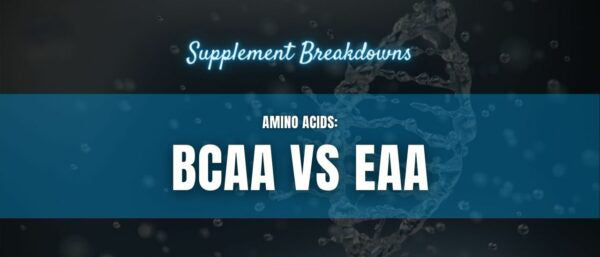

For many fitness enthusiasts, BCAA and EAA supplements have become a staple in their workout routine. But what exactly are these supplements, and what's the difference between the two?
In this article, we dive into the world of BCAA vs EAA, exploring what they are, the differences between them and which one might be the better choice for your fitness journey.
What are amino acids?
Amino acids are kind of like the building blocks of life. They're small, naturally occurring compounds that play a big role in your overall health. There are 21 amino acids used by the body to make proteins, hormones, neurotransmitters, enzymes and other key components of the human body.
Think of amino acids like letters and proteins like words. Just as different combinations of letters form different words, different combinations of amino acids form different proteins.
And just like how the meaning of a word is determined by its letters, the properties and functions of a protein are determined by the specific sequence of amino acids.
Cool, right?
But here's the thing: your body can only make 11 of these amino acids on its own. You have to get the other 9 from the food you eat or from supplements. In the next section, we’ll learn more about these other 9.
What are essential amino acids (EAA)?
The term essential amino acid (EAA) refers to the 9 amino acids that your body cannot produce on its own and must be obtained from dietary sources. One example of an essential amino acid is phenylalanine. Phenylalanine is used by the body to create neurotransmitters, which help regulate mood and mental alertness. Good sources of phenylalanine include dairy products, meat, and eggs.
An EAA supplement is a type of dietary supplement that contains all 9 essential amino acids in a convenient, easy-to-take form. It is often marketed towards fitness enthusiasts as a way to boost muscle growth and repair through physical activity. However, they also offer a range of benefits beyond the gym, such as supporting the immune system, promoting a healthy digestive system, and enhancing cognitive function.
Essential vs non-essential amino acids
|
Non-essential amino acids |
Essential amino acids |
|
Alanine |
Histidine |
|
Arginine* |
Isoleucine |
|
Asparagine |
Leucine |
|
Aspartic Acid |
Lysine |
|
Cysteine* |
Methionine |
|
Glutamic Acid |
Phenylalanine |
|
Glutamine* |
Threonine |
|
Glycine* |
Tryptophan |
|
Proline* |
Valine |
|
Serine* |
|
|
Selenocysteine |
|
|
Tyrosine* |
* under normal circumstances, your body can create these 7 non-essential amino acids on its own. However, in times of illness and stress, your body may be limited in its ability to create them - in which case you’ll need to get these from your diet. These are sometimes referred to as conditional amino acids
What are branched-chain amino acids (BCAA)?
The term branched-chain amino acid refers to three specific EAAs that have a unique, branched chemical structure - and this sets them apart from other essential amino acids. Their branched structure allows them to be metabolised directly in the muscle.
BCAAs have been known to boost muscle growth, minimise muscle damage during exercise and accelerate recovery. They also help reduce fatigue during high-intensity training.
For these reasons, BCAAs have been a favourite in the fitness world for years.
The three branched-chain amino acids are:
- Isoleucine
- Leucine
- Valine
* Chemical structure of the branched-chain amino acid leucine
EAA vs BCAA: What’s the verdict?

Before deciding between a BCAA or EAA supplement, it's important to make sure you're getting enough protein in general. If you're not hitting your protein targets, it's better to opt for neither BCAAs nor EAAs - and instead reach for a complete protein supplement like VORA Good Shape Protein powder.
Good Shape Protein is a complete protein, meaning it contains all 21 amino acids, rather than just the 9 essential amino acids or the 3 branched-chain amino acids.
If you are meeting your protein needs, and you want to supplement for improved muscle recovery, protein synthesis, immune function and overall health, we believe EAAs are a better choice than BCAAs, since they provide the full spectrum of essential amino acids, including the three BCAAs.
When are BCAAs useful?
So, if EAAs are the top choice, are there any situations where BCAAs are useful? There sure are! Here are some situations where BCAAs might make sense for you:
- You’re vegan and you train. Vegan protein sources tend to be low in BCAAs, so if you train hard, adding BCAAs is one way to make sure you’re getting the muscle-building and recovery benefits from your protein.
- You want to beat hunger. Since BCAAs are broken down directly in the muscles and not in the liver, they are thought to help regulate appetite and decrease food cravings. Some people also report that drinking BCAA supplements, which often come in fruity flavours, can help satisfy sweet cravings.
Bottom line
At the end of the day, the choice between EAA vs BCAA ultimately comes down to your personal goals and needs. Instead of just grabbing the first option you see, it's important to understand how amino acids work in your body and choose the supplement that best aligns with what you're trying to achieve.
Don't be afraid to do some research, ask your trainer or consult with a doctor to help you make the best decision. And remember, every step towards your fitness journey, no matter how small, is a step in the right direction!
← Older post Newer post →
